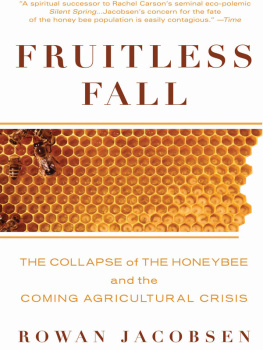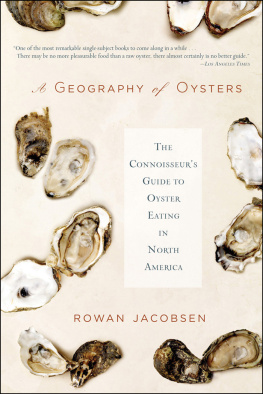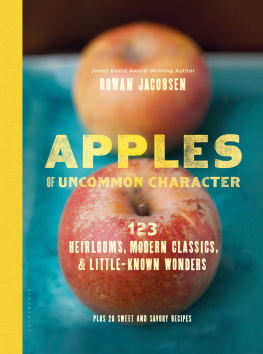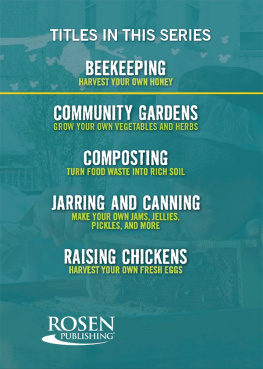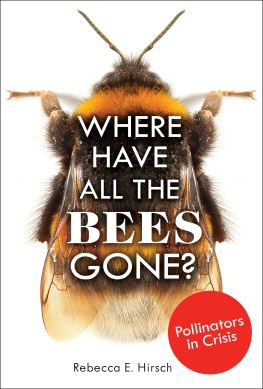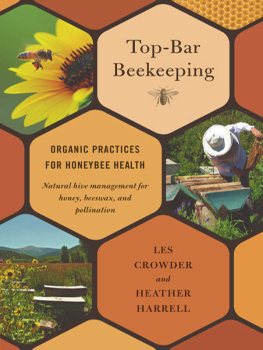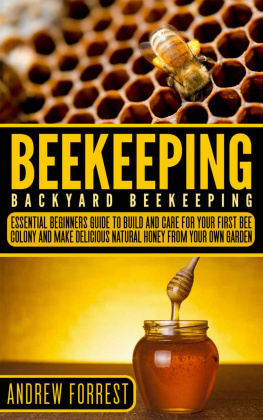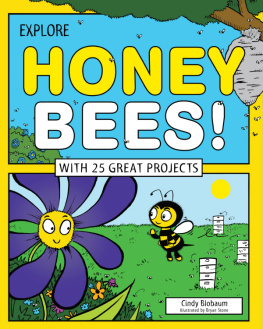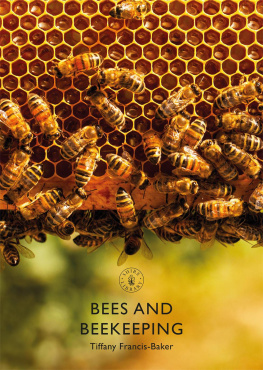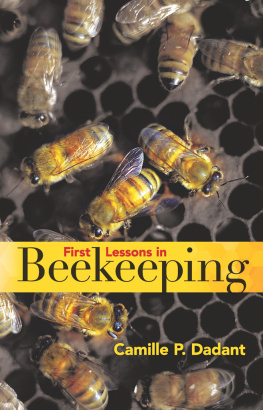Praise forFruitless Fall
Past a certain point, we cant make nature conform to our industrial model. The collapse of beehives is a warningand the cleverness of a few beekeepers in figuring out how to work with bees not as masters but as partners offers a clear-eyed kind of hope for many of our ecological dilemmas.
Bill McKibben, author ofDeep Economy
Jacobsen reminds readers that bees provide not just the sweetness of honey, but also are a crucial link in the life cycle of our crops.
Seattle Post-Intelligencer
Written with a passion that gives this exploration of colony collapse disorder real buzz... Jacobsen invests solid investigative journalism with a poets voice to craft a fact-heavy book that soars.
Publishers Weekly
Rowan Jacobsen tells the fascinatingand alarmingstory of honeybee decline with energy and insight.
Elizabeth Kolbert, author of
Field Notes from a Catastrophe
A passionate sequel to Rachel Carsons Silent Spring.
New York Observer
Although Rachel Carson famously warned us about pesticides causing a silent spring, we now face a fruitless fall. Jacobsen explains why with compelling lucidity, carefully documented facts, and a deep respect for the sophisticated and diligent honeybee.
Booklist(starred review)
The apiculture industry now has its own Upton SinclairFruitless Fall is an eye-opening, attitude-changing, and exceptionally engaging examination of Americas most overlooked multi-billion-dollar industry.
May Berenbaum, professor of Entomology,
University of Illinois, and Chair,
National Research Council Committee on
the Status of Pollinators in North America
In this densely woven account of waggle dances, almond trees, and confounded pathologists, Jacobsen tells the story of CCD: how it happened, the likely culprits, and its implications for the future of agriculture.
Seed
Intelligent, important assessment of a confusing phenomenon and its potentially catastrophic implications.
Kirkus Reviews
Rowan Jacobsen visited citrus groves in Florida and almond fields in California for his new book, Fruitless Fall... Jacobsen, who explains the science in accessible language, ends the book on a note of optimism: Hes ordered another colony of bees.
Boston Globe
FRUITLESS
FALL
The Collapse of the Honey Bee
and the Coming Agricultural Crisis
Rowan Jacobsen

Copyright 2008 by Rowan Jacobsen
Afterword copyright 2009 by Rowan Jacobsen
All rights reserved. No part of this book may be used or reproduced in any manner whatsoever without written permission from the publisher except in the case of brief quotations embodied in critical articles or reviews. For information address Bloomsbury USA, 175 Fifth Avenue, New York, NY 10010.
Published by Bloomsbury USA, New York
Illustrations copyright 2008 by Mary Elder Jacobsen. Barranc Fondo cave art inspired by Eva Crane. Bucket orchid inspired by Michael Woods.
All papers used by Bloomsbury USA are natural, recyclable products made from wood grown in well-managed forests. The manufacturing processes conform to the environmental regulations of the country of origin.
LIBRARY OF CONGRESS CATALOGING-IN-PUBLICATION DATA
Jacobsen, Rowan.
Fruitless fall: the collapse of the honeybee and the coming agricultural crisis / Rowan Jacobsen.1st U.S. ed.
p. cm.
Includes bibliographical references and index.
eISBN: 978-1-60819-253-3
1. HoneybeeDiseasesUnited States. 2. Colony collapse disorder of honeybeesUnited States. I. Title.
SF538.3.U6J33 2008
638'.15dc22
2008026126
First published by Bloomsbury USA in 2008
This paperback edition published in 2009
1 3 5 7 9 10 8 6 4 2
Typeset by Westchester Book Group
Printed in the United States of America by Quebecor World Fairfield
CONTENTS
AUTHORS NOTE
Copyeditors of the world beware. The spelling of insect names in this book follows the rules of the Entomological Society of America, not Merriam-Websters. When a species is a true example of a particular taxon, that taxon is written separately. Honey bees and bumble bees are true bees, and black flies are true flies. A yellowjacket, however, is not a true jacket. Entomologists, who have to read the names of bugs a lot more than the rest of us do, would appreciate it if we all followed these rules.
L ATE IN THE afternoon of November 12, 2006, Dave Hackenberg stepped into a Florida field of Brazilian peppers that should have been buzzing with honey bees and noticed that it wasnt. Hackenberg, a commercial beekeeper, had four hundred of his best hives in this particular beeyard. It was a mild day, sunny and 65 degrees, good flying conditions, and thousands of bees should have been zipping purposefully about on their nectar errands. But there werent enough bees in the air for ten hives, much less four hundred.
Hackenberg didnt think much about it. His bees had been grooving on these Brazilian peppersan invasive menace to Florida ecosystems but a nectar-rich boon to beekeepersfor weeks, but now a cold front had come to Florida and shut off the nectar flow. Hackenberg figured there were no bees in the air because there was no food to gather.
Its been forty years since Hackenberg, who owns one of the largest apiaries in Pennsylvania, let his bees overwinter in the Keystone State. The bees were some of the original snowbirds, making the late-fall trek to Florida starting in the 1960s. Honey bees can survive a Northeast winter, clustering in a ball in the middle of their cold hive, vibrating their wing muscles to stay warm, and living off their honey stores, but things are easier in Florida, where nectar flows much of the mild winter.
Hackenberg lit a smoker and approached the first hive. Hed been pleased with these hives when hed dropped them off a few weeks earlier. Theyd been strong, thick with bees and brood, and with all the Brazilian peppers around he was sure theyd now be full of honey to get through the winter. It was a rare good feeling.
For the past two or three years, hed had this nagging sense that something was wrong with his bees. He couldnt put his finger on what it was, but he knew what it wasnt: not varroa mites, the scourge of beekeepers everywhere, nor hive beetles, wax moths, or any of the other honey bees pests. He knew the signs of colonies suffering those afflictions, and this was something different. What ever it was, it was subtle. If he hadnt been watching bees most of his life, hed have dismissed the feeling. But he knew bees, and sometimes his werent acting right. They almost seemed... nervous.
He wasnt alone in his concern. In January 2005, his good friend Clint Walker, a major Texas beekeeper, had called him in distress. Theyre gone, Dave, hed said on the phone.
What are, Clint?
My bees. Theyre dying. Two thirds of the Walker Honey Companys two thousand hives had suddenly collapsed.
Hackenberg had told Walker that he must have a mite problem. Over the past fifteen years, beekeepers have learned to blame everything on varroa mites. These pinhead-sized parasites, sometimes called vampire mites, sink their fangs into bee larvae and adults, introducing diseases in the process. If left unchecked, they can wipe out a whole colony. Several chemicals have been developed to treat hives infested with varroa, but the mites have developed resistance to the chemicals at a faster pace. They caused horrific losses throughout the 1990s and still kill hundreds of thousands of colonies a year. But Walker didnt think mites were responsible this time. His bees had collapsed after feeding for a month in the West Texas cotton fields. They must have done something different to the cotton this year, hed told Hackenberg.
Next page
